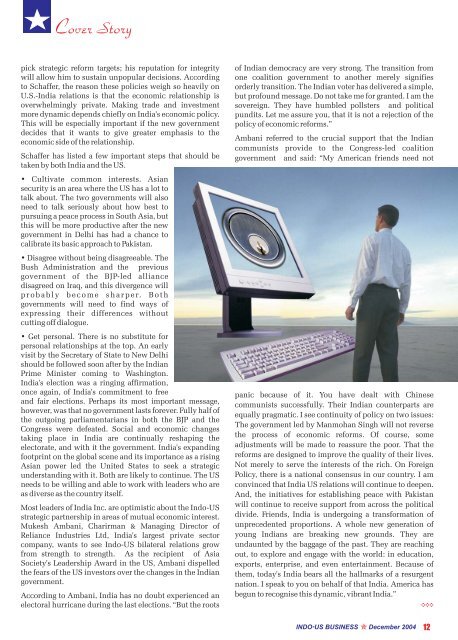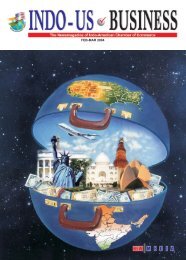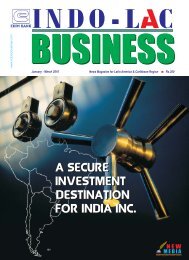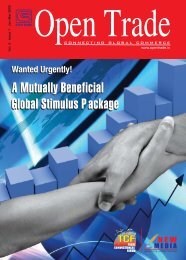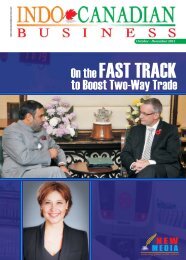Indo-US Partnership - new media
Indo-US Partnership - new media
Indo-US Partnership - new media
Create successful ePaper yourself
Turn your PDF publications into a flip-book with our unique Google optimized e-Paper software.
Cover Story<br />
pick strategic reform targets; his reputation for integrity<br />
will allow him to sustain unpopular decisions. According<br />
to Schaffer, the reason these policies weigh so heavily on<br />
U.S.-India relations is that the economic relationship is<br />
overwhelmingly private. Making trade and investment<br />
more dynamic depends chiefly on India's economic policy.<br />
This will be especially important if the <strong>new</strong> government<br />
decides that it wants to give greater emphasis to the<br />
economic side of the relationship.<br />
Schaffer has listed a few important steps that should be<br />
taken by both India and the <strong>US</strong>.<br />
• Cultivate common interests. Asian<br />
security is an area where the <strong>US</strong> has a lot to<br />
talk about. The two governments will also<br />
need to talk seriously about how best to<br />
pursuing a peace process in South Asia, but<br />
this will be more productive after the <strong>new</strong><br />
government in Delhi has had a chance to<br />
calibrate its basic approach to Pakistan.<br />
• Disagree without being disagreeable. The<br />
Bush Administration and the previous<br />
government of the BJP-led alliance<br />
disagreed on Iraq, and this divergence will<br />
probably become sharper. Both<br />
governments will need to find ways of<br />
expressing their differences without<br />
cutting off dialogue.<br />
• Get personal. There is no substitute for<br />
personal relationships at the top. An early<br />
visit by the Secretary of State to New Delhi<br />
should be followed soon after by the Indian<br />
Prime Minister coming to Washington.<br />
India's election was a ringing affirmation,<br />
once again, of India's commitment to free<br />
and fair elections. Perhaps its most important message,<br />
however, was that no government lasts forever. Fully half of<br />
the outgoing parliamentarians in both the BJP and the<br />
Congress were defeated. Social and economic changes<br />
taking place in India are continually reshaping the<br />
electorate, and with it the government. India's expanding<br />
footprint on the global scene and its importance as a rising<br />
Asian power led the United States to seek a strategic<br />
understanding with it. Both are likely to continue. The <strong>US</strong><br />
needs to be willing and able to work with leaders who are<br />
as diverse as the country itself.<br />
Most leaders of India Inc. are optimistic about the <strong>Indo</strong>-<strong>US</strong><br />
strategic partnership in areas of mutual economic interest.<br />
Mukesh Ambani, Charirman & Managing Director of<br />
Reliance Industries Ltd, India's largest private sector<br />
company, wants to see <strong>Indo</strong>-<strong>US</strong> bilateral relations grow<br />
from strength to strength. As the recipient of Asia<br />
Society's Leadership Award in the <strong>US</strong>, Ambani dispelled<br />
the fears of the <strong>US</strong> investors over the changes in the Indian<br />
government.<br />
According to Ambani, India has no doubt experienced an<br />
electoral hurricane during the last elections. “But the roots<br />
of Indian democracy are very strong. The transition from<br />
one coalition government to another merely signifies<br />
orderly transition. The Indian voter has delivered a simple,<br />
but profound message. Do not take me for granted. I am the<br />
sovereign. They have humbled pollsters and political<br />
pundits. Let me assure you, that it is not a rejection of the<br />
policy of economic reforms.”<br />
Ambani referred to the crucial support that the Indian<br />
communists provide to the Congress-led coalition<br />
government and said: “My American friends need not<br />
panic because of it. You have dealt with Chinese<br />
communists successfully. Their Indian counterparts are<br />
equally pragmatic. I see continuity of policy on two issues:<br />
The government led by Manmohan Singh will not reverse<br />
the process of economic reforms. Of course, some<br />
adjustments will be made to reassure the poor. That the<br />
reforms are designed to improve the quality of their lives.<br />
Not merely to serve the interests of the rich. On Foreign<br />
Policy, there is a national consensus in our country. I am<br />
convinced that India <strong>US</strong> relations will continue to deepen.<br />
And, the initiatives for establishing peace with Pakistan<br />
will continue to receive support from across the political<br />
divide. Friends, India is undergoing a transformation of<br />
unprecedented proportions. A whole <strong>new</strong> generation of<br />
young Indians are breaking <strong>new</strong> grounds. They are<br />
undaunted by the baggage of the past. They are reaching<br />
out, to explore and engage with the world: in education,<br />
exports, enterprise, and even entertainment. Because of<br />
them, today's India bears all the hallmarks of a resurgent<br />
nation. I speak to you on behalf of that India. America has<br />
begun to recognise this dynamic, vibrant India.”<br />
<br />
INDO-<strong>US</strong> B<strong>US</strong>INESS December 2004<br />
12


